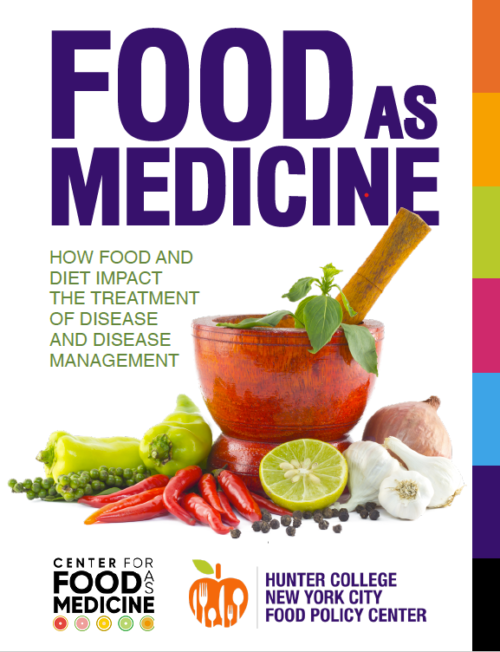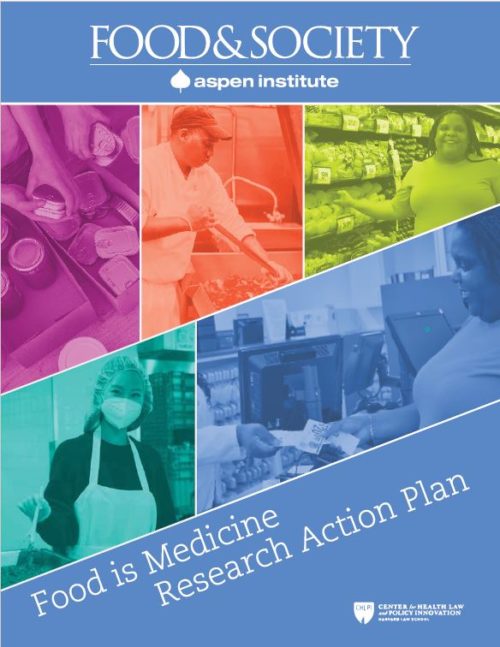Weekend reading: Food as Medicine
The Center for Food As Medicine and the Hunter College NYC Food Policy Center have released their first-ever academic narrative review and report of the food-as-medicine movement: Food as medicine review and report: how food and diet impact the treatment of disease.

As the press release puts it,
Food has always been a part of medical practice, going back millennia; however, as medical procedures and treatments became more sophisticated, modern societies began to disregard the role of food in the treatment of disease. Using food to treat disease was viewed as an uncivilized approach. This led to a gap between modern medicine and the use of food to treat disease, and a lack of acceptance of food-based interventions in modern treatment plans.
the report has five parts:
- Background information on the history of using food to treat disease,
- Modern challenges to widespread use and acceptance of food as medicine practices,
- Current evidence about contemporary food as medicine practices (such as medically tailored meals, produce prescriptions, and functional foods),
- Literature review of food as treatment for specific disease states, and
- Recommendations to stakeholders (including policymakers, health care professionals, and academics) to contribute to a healthier, more equitable health care system.
Here are the report’s key findings (my paraphrase)
- Medical schools do not often require nutrition instruction.
- Social media makes food as medicine appear pseudoscientific.
- Websites confuse the public about role of food in disease prevention and treatment.
- Supplements cause confusion.
- Dietary Guidelines are influenced by food companies and do not always reflect current science.
- The FDA allows misleading marketing and health claims on packaged foods.
- Research funded by food companies misleads the public.
- Nutrition incentive programs (e.g., NYC’s Health Bucks) can help combat food and nutrition insecurity.
- The government should support food as medicine interventions such as medically tailored meals and produce prescription programs.
See Food Tank: 22 Global Medical Professionals Practicing Food as Medicine
Here are 22 medical professionals working to use food as a critical tool for treating, controlling, and healing from illness and maintaining health.
Along those lines, The Rockefeller Foundation Commits USD 105M to Making Healthy and Sustainable Foods More Accessible Around the World.
Today The Rockefeller Foundation launched its new Good Food Strategy, which will invest USD 105 million over three years to increase access to healthy and sustainable foods for 40 million underserved people around the globe. The program will support a shift in public and private spending toward foods that are nutritious, regenerate the environment, and create equitable economic opportunity for people at every step of the food supply chain.
And here is Dr. David Katz on this theme.
We could transition from the dual costs of medication to fix only partly all the parts of us food keeps breaking. Food as the medicine long ago invoked by Hippocrates could save lives, vitality, biodiversity — and a vast fortune into the bargain. The drumbeat tolls of necessity in the guise of diabetes, heart disease, obesity, cancer, dementia, climate change — and the acutely calamitous toll of COVID, as well. We may, whenever so inclined, invoke the will to invent the better way.
And let’s not forget the Food is Medicine Initiative from the Aspen Institute. which I wrote about previously here.
Comment: I prefer to think of food as food (a pleasure) and medicine as medicine (a pain) and not conflate them, but there s no question that eating healthfully is a good health habit along with being active, getting enough sleep, and not smoking, or overdoing on alcohol or recreational drugs. If food-as-medicine initiatives help people eat more healthfully, it’s hard to argue with them, and I won’t.


